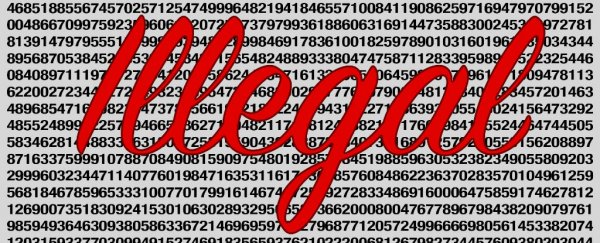Despite the law being one of the most ancient and fundamental aspects of being a social human being, there sure are a lot of inscrutable ones. Like, did you know that it's illegal to play bingo for too long in North Carolina? And in Minnesota, you'd better not be playing games with greased-up pigs, because that's against the law too.
It might sound utterly non-sensical, but in the United States, it's also illegal to know, possess, or distribute one very long, very specific prime number.
As the Wendoverproductions video above explains, the fact that this illegal number also happens be a prime number is key: prime numbers are like very special unicorns in the world of mathematics, and we're fast running out them. Well, running out of them in the sense that our limited human brains are finding it increasingly difficult to identify new ones.
So what exactly is a prime number? Defined as integers (whole numbers) that can be divided only by one and themselves, prime numbers cannot be divided by any other number to result in a another whole number. For example, 7 can only be divided by 1 or 7 to come up with a whole number - divide it by 2, 3, 4, or 5, and you'll get a decimal number, like 3.50, or 2.33.
Confirming that a certain number is a prime number is easy when you've got something small, like 7 or 29, but mathematicians are well beyond that now. Back in January, the largest prime number ever found was announced to be 22 million digits long. It's written like this: 274,207,281-1.
Imagine how long it takes to test every possible number that you could divide a 22-million-digit-long integer with, and you'll start to understand why discovering new primes is so much work. And right now, our best computers are struggling.
It might not seem like it, but each and every one of us has a stake in how many prime numbers mathematicians can discover, because they're integral to the encryption processes that lock down our online bank accounts and Apple smartphones.
According to the video above, prime numbers are so important for encryption, the Electronic Frontier Foundation is willing to pay up to $250,000 for a new one.
So that's all well and good, but what's it got to do with the law? Well, in 1978, the Digital Millennium Copyright Act was passed in the US which prohibits anyone from subverting copyright-prevention measures, and very specific prime numbers fall under this law when it comes to CDs and DVDs
I'll let the guys from Wendoverproductions explain what that number is, but let's just say it looks like this 85650789657397829, followed by 1,402 numbers that we're not going to tell you, obviously.
Now that we've got illegal primes sorted, have you ever wondered what the biggest possible number is?
